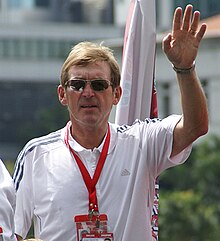
Back كيني دالغليش Arabic كينى دالجليش ARZ Kenny Dalglish Aymara Кени Далглиш Bulgarian Kenny Dalglish Catalan Kenny Dalglish Czech Kenny Dalglish Welsh Kenny Dalglish Danish Kenny Dalglish German Κέννυ Νταλγκλίς Greek
 Dalglish in Singapore in 2009 | |||
| Personal information | |||
|---|---|---|---|
| Full name | Kenneth Mathieson Dalglish[1] | ||
| Date of birth | 4 March 1951[1] | ||
| Place of birth | Glasgow, Scotland | ||
| Height | 5 ft 8 in (1.73 m)[2] | ||
| Position(s) | Forward | ||
| Youth career | |||
| 1967–1968 | Cumbernauld United | ||
| 1968–1969 | Celtic | ||
| Senior career* | |||
| Years | Team | Apps | (Gls) |
| 1969–1977 | Celtic | 204 | (111) |
| 1977–1990 | Liverpool | 355 | (118) |
| Total | 559 | (229) | |
| International career | |||
| 1972–1976 | Scotland U23[3] | 4 | (2) |
| 1971–1986 | Scotland | 102 | (30) |
| Managerial career | |||
| 1985–1991 | Liverpool | ||
| 1991–1995 | Blackburn Rovers | ||
| 1997–1998 | Newcastle United | ||
| 2000 | Celtic (interim) | ||
| 2011–2012 | Liverpool | ||
| *Club domestic league appearances and goals | |||
Sir Kenneth Mathieson Dalglish MBE (born 4 March 1951) is a Scottish former football player and manager. He is regarded as one of the greatest players of all time as well as one of Celtic's, Liverpool's and Britain's greatest ever players.[4][5][6][7][8] During his career, he made 338 appearances for Celtic and 515 for Liverpool, playing as a forward, and earned a record 102 caps for the Scotland national team, scoring 30 goals, also a joint record. Dalglish won the Ballon d'Or Silver Award in 1983, the PFA Players' Player of the Year in 1983, and the FWA Footballer of the Year in 1979 and 1983. In 2009, FourFourTwo magazine named Dalglish the greatest striker in post-war British football, and he has been inducted into both the Scottish and English Football Halls of Fame. He is very highly regarded by Liverpool fans, who still affectionately refer to him as King Kenny, and in 2006 voted him top of the fans' poll "100 Players Who Shook the Kop".
Dalglish began his career with Celtic in 1971, going on to win four Scottish league championships, four Scottish Cups and one Scottish League Cup with the club. In 1977, Liverpool manager Bob Paisley paid a British transfer record of £440,000 to take Dalglish to Liverpool. His years at Liverpool were among the club's most successful periods, as he won six English league championships, the FA Cup, four League Cups, five FA Charity Shields, three European Cups and one European Super Cup. In international football, Dalglish made 102 appearances and scored 30 goals for Scotland between 1971 and 1986, becoming their most capped player and joint-leading goal scorer (with Denis Law). He was chosen for Scotland's FIFA World Cup squads in 1974, 1978, 1982 and 1986, playing in all of those tournaments except the latter, due to injury.
Dalglish became player-manager of Liverpool in 1985 after the resignation of Joe Fagan, winning a further three First Divisions, two FA Cups and four FA Charity Shields, before resigning in 1991. Eight months later, Dalglish made a return to football management with Blackburn Rovers, whom he led from the Second Division to win the Premier League in 1995. Soon afterwards, he stepped down as manager to become Director of Football at the club, before leaving altogether in 1996. In January 1997, Dalglish took over as manager at Newcastle United. Newcastle finished as runners-up in the Premier League during his first season, but they only finished 13th in 1997–98, which led to his dismissal the following season. Dalglish went on to be appointed Director of Football at Celtic in 1999, and later briefly manager. He won the Scottish League Cup in 2000 before an acrimonious departure that year.
Between 2000 and 2010, Dalglish focused on charitable concerns, founding The Marina Dalglish Appeal with his wife to raise money for cancer care. In January 2011, Dalglish returned to Liverpool for a spell as caretaker manager after the dismissal of Roy Hodgson, becoming the permanent manager in May 2011. Despite winning the League Cup, which was the club's first trophy since 2006, earning them a place in the UEFA Europa League, and reaching the FA Cup Final, Liverpool only finished 8th in the Premier League, and Dalglish was dismissed in May 2012. In October 2013, Dalglish returned to Anfield as a non-executive director, and Anfield's Centenary Stand was renamed after him in October 2017.
- ^ a b "Kenny Dalglish". Barry Hugman's Footballers. Retrieved 30 December 2018.
- ^ Rollin, Jack (1980). Rothmans football yearbook. London: Queen Anne Press. p. 222. ISBN 0362020175.
- ^ "Scotland U23 player Kenny Dalglish". FitbaStats. Retrieved 10 July 2018.
- ^ "The 100 Best Footballers of All Time". Bleacher Report. 31 May 2011. Retrieved 23 October 2023.
- ^ "Ranked! The 100 best football players of all time". FourFourTwo. 5 September 2023. Retrieved 16 September 2023.
- ^ "Best Liverpool players ever, the top 50". The Telegraph. 23 March 2015. Retrieved 16 September 2023.
- ^ "TBest Scottish Footballers Ever: Here are Scotland's 10 best footballers of all time - according to our readers". The Scotsman. 15 March 2023. Retrieved 23 October 2023.
- ^ "Ranked! The 25 best British players of all time". FourFourTwo. 14 April 2023. Retrieved 23 October 2023.
© MMXXIII Rich X Search. We shall prevail. All rights reserved. Rich X Search